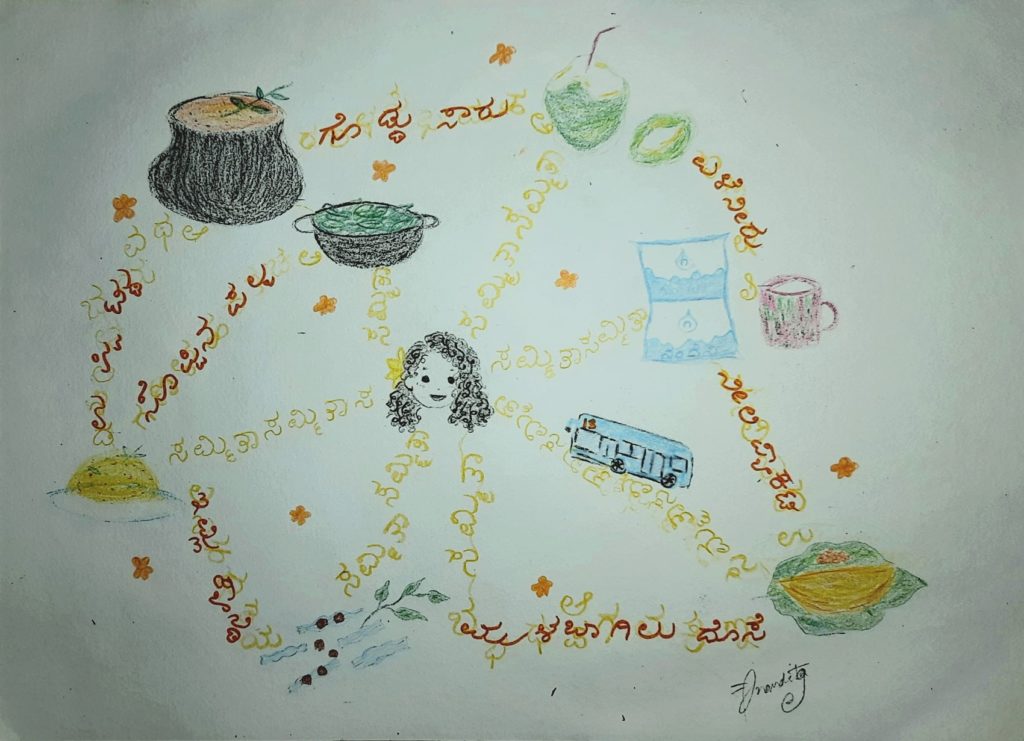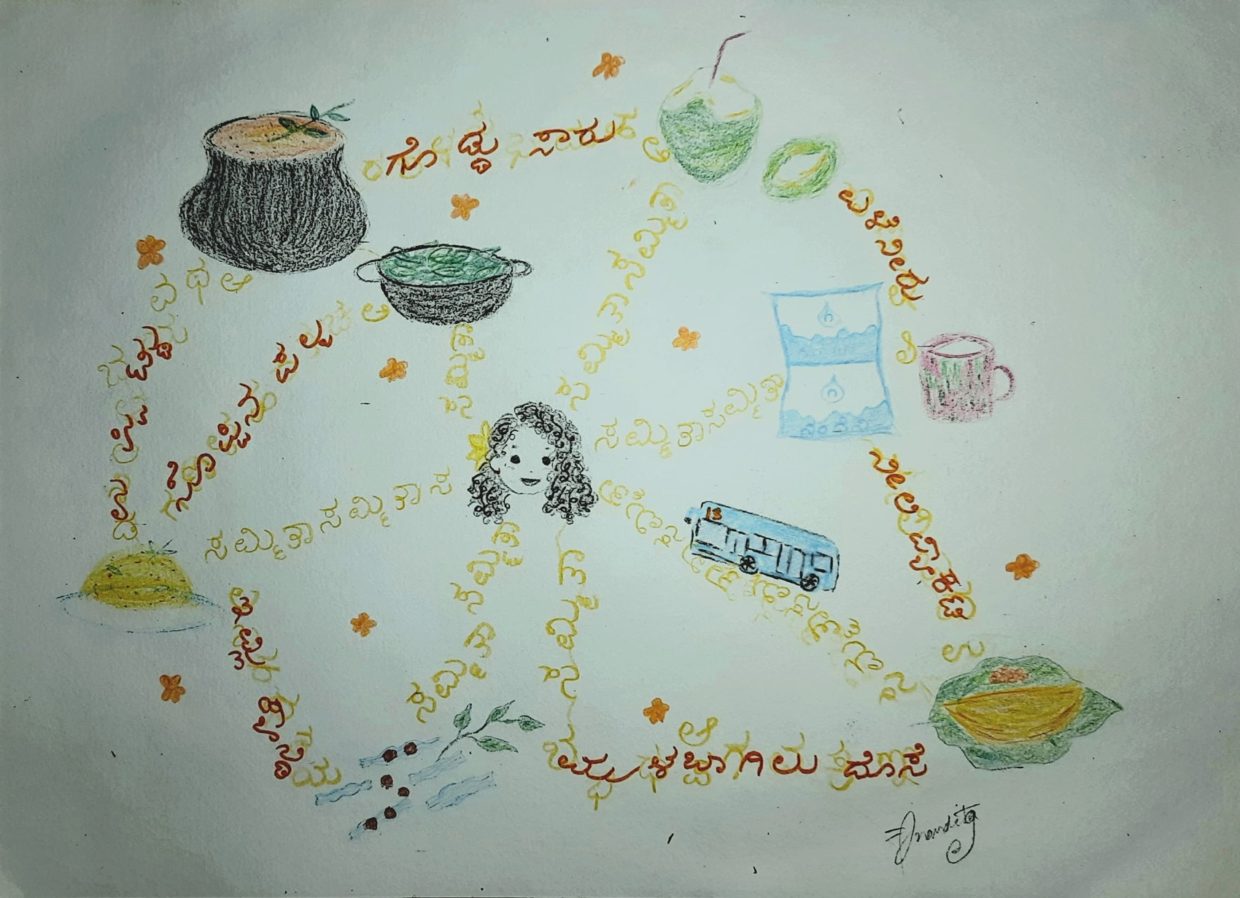This essay by Sammita Hullemane won the third place in the Mother Tongue Essay Contest held in April 2023. The judge, Dipannita Mukherjee, a teacher at Inventure Academy, had this to say, “It was so hard to pick but I went with what made me smile the most (and also hungry).”
The word jaggery is not sweet. A simple wikipedia search tells me the story of how it was misplaced by the Sanskrit language into a Portuguese person’s mouth and vomited out of an English speaker’s mouth. It takes me to sweaty, annoying days in third standard and inflammatory hand gestures.
What happened to the soft, unvoiced consonants? Where is the taste of amma’s godsaaru and soppina palya? Where is the memory of a childhood trip to the cane fields, watching from beneath thatched shade how the kabbina haalu boils and bubbles and flows, mixes with lemon juice and cools slowly into round, beautiful moulds?
The word bella reminded me first of Beauty and the Beast. The main character is named Belle and her iconic dress is the most beautiful golden yellow. Belle means beautiful in French and bella tastes beautiful in my mother tongue.

I grew up in love with languages. I wanted to twist and wrap and stretch my tongue until the entire world could fit onto it. The semantic intricacies of Hindi was lost on me but when they were coming out of Shah Rukh Khan’s mouth I couldn’t help but feel. French textbooks felt like detective mysteries, where you take the english version and flip it over, find its second cousin and aha – you’ve found the solution! Mandarin had me conducting my voice into tune like an orchestra, and ASL had them choreographed in accented waves and angles. I looked for space on my tongue to fit Xhosa and Tagalog and ISL and Farsi.
“Stop speaking Kannada!” my teacher shouts. I am not worried because I don’t speak Kannada. Not at school, rarely at home. In a fifty-student classroom, there was never enough space for Kannada. I heard from friends and older, cooler kids that speaking only english is cool. I knew how to read english and watched only english shows. That made me cool, too. I was cool.
Cooler still was yelneeru, which the uncle would bring through each street in summer, draped on his cycle. Another uncle would also come, to climb our tree and retrieve more coconuts, but ours were usually rotten or dry. The rare fresh one was immediately grated on the thuriyo mane and any meagre drops of sweet, concentrated juice were poured by amma into a small steel lota and placed onto the kitchen counter. By the time she put oggarane for the uppittu, it was expected to be shared and finished by me and my sister. I remember twisting the cup in all directions to avoid the coarse fibres.
At quiet moments between hour long dictations and unsolicited pacer tests in September, we hid behind the big tree at the edge of the football field. We spoke about annoying sisters and fussy parents and boring French class and reached deep into our pockets to retrieve small round balls of illicit imli candies. My classmate, a girl who I didn’t particularly like except for sharing candies with, tells me You’re lucky to have english as a mother tongue. What do you mean by mother tongue I’d asked. Like, your native language – the easiest one for you, she says between chews. I’m not really sure, I replied. The language that my mother speaks is Kannada. But at home we speak both english and No I mean the one your family speaks in. Only one. It’s mother tongue not mother tongues. I remembered all at once why I did not like sitting with her and my face was overcome with an expression I want to remember as confusion.
Amma tells the story of how I was addicted to nandini haalu as a four year old. Every day, without fail, two litres would disappear down your throat. The green and pink dora cup, filled three fourths of the way from the neeli packet, one and a half spoons of bournvita, microwaved for thirty seconds exactly. On one particularly day you wanted more milk, and asked aunty. More milk! More milk! You kept asking. At this point, Aunty enters the conversation, recognising the familiar phrase. She laughs about how she didn’t understand me at all, and struggled for fifteen minutes before calling amma, who quickly explained to her what it meant. She liked to think of it as the starting point of her learning english.
I don’t want this to be a sad essay. I tend to resent myself and others very strongly when it comes to certain things that I love and am losing.
Recently I love going in the bus and looking at the restaurant signs that pass by. I like trying to figure out how the spellings have changed over time. Mulabagilu dose lost the ‘i’ and the ‘u’ sounds as if placed in an english person’s mouth first, returning as Mulbagal. But on the sign, they write it that way even in Kannada! Isn’t that strange, I ask. “Eega adhene Kannadadalli helu.”
It is a very humble challenge, but when amma asks me to repeat my long dinnertime monologue in Kannada, I become silent. My insides become hollow and I search its walls with blind, desperate hands, because suddenly I have nothing to say. Something about ease and culture and loss and mothers. Tongues that freeze up when you need them. Receiving a book at seventeen but taking two whole minutes to get through ‘nanagu ninagu neeru beku’ and then crying. Trying and failing two months ago to read the signs from the bus at all. Now I can read them, but I am silent. My words are always too little, too late. I had a conclusion to the story about Mulabagilu dose, and I tell it in my head. About how I feel equal parts excited and annoyed when I notice these changes, but I need to summon all of my years of passionate language study to remember that change is healthy and good for languages. It helps us open up to a bigger world. I cannot resent anyone for wanting that. I cannot resent anyone for wanting that for me.
I cannot tell that story in Kannada, and I can’t tell you this essay either. But I can tell you that Anna made the saaru today, and he put in so much bella that it tastes like payasa. Amma shakes her head disappointedly, but we all know that that’s when it tastes best. I pick up one tthutthu and then another. And slowly, eventually, I begin to feel full.
Sammita Hullemane
Latest posts by Sammita Hullemane (see all)
- The word jaggery is not sweet. - 21st September 2023





